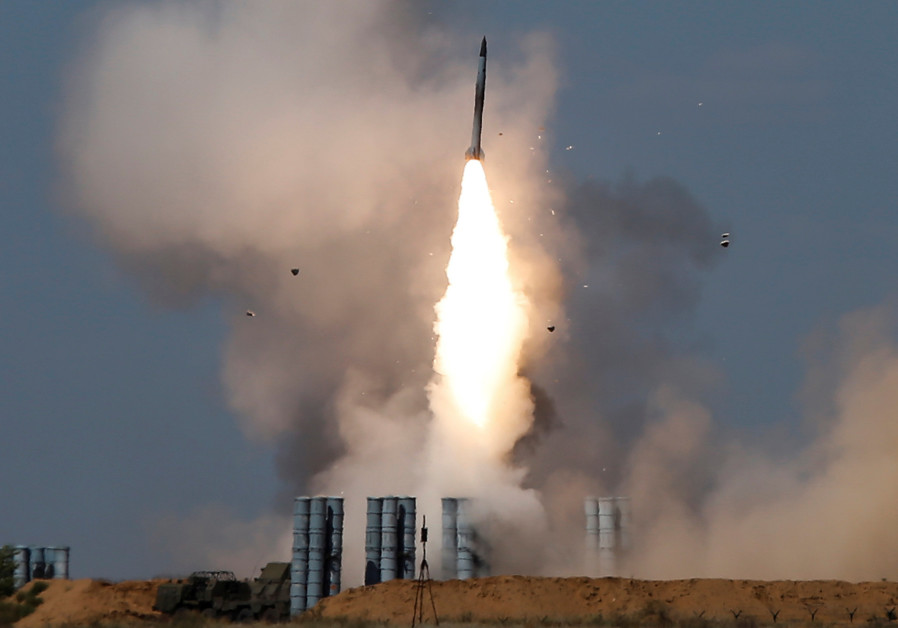Defense Minister Liberman seeks assurances from Russia on Syria and Iran

An S-300 air defense missile system launches a missile during the International Army Games 2017 outside Astrakhan, Russia August 5, 2017. (photo credit: REUTERS/MAXIM SHEMETOV)
Defense Minister Avigdor Liberman on Thursday sought assurances from Russia that their advanced missile defense systems will not be used against Israeli jets over Syria, while calling on Moscow to condemn Iran for their repeated threats against the Jewish State.
“We have normal relations with Russia and we take into account its interests. We hope that Russia will take into account our interests here in the Middle East. We expect Russia’s understanding and support for our vital interests,” he said in an interview with the Russian newspaper Kommersant.
“Iran’s leaders come out every week with statements that they will destroy the Zionist entity. Unfortunately, we do not see an unequivocal reaction from Western Europe or Russia, which is very careful to remember everything that happened in World War II. And we expect a clear and unequivocal response by Russia to Iran’s declarations and actions,” Liberman added.
Touting the fact that Israel did not expel any Russian diplomats in response to an assassination attempt on a former Russian double agent and his daughter in England earlier this year, Liberman said that Israel has “established special relations” with Moscow which are effective and transparent.
“We are not looking for any confrontation with Russia, and on the contrary, in recent years, an open, clear and transparent dialogue has been created with Russia, both when our opinions are compatible and incompatible,” Liberman said.
Russian and Israeli officials have met several times in the past year, implementing a system over Syria to coordinate their actions in order to avoid accidental clashes with Russia carrying out military operations in Syria and Israel reportedly responsible for several hundred airstrikes in the war torn country.
Last week, the paper published a report that Moscow was considering the possibility of supplying the advanced S-300 missile defense system to Syria free of charge, following US-led strikes against several military sites after a deadly chemical weapons attack on the town of Douma on April 7th.
“If Assad does not intervene – it would be very wise of him not to, as we do not plan to interfere in Syria’s internal affairs. If his forces, his aerial defense systems, open fire against us – we will open fire against them,” Liberman said echoing comments he made at The Jerusalem Post conference in New York City last week.
“As far as I am concerned, Assad is a war criminal, responsible for the deaths of more than half a million citizens of his country. But we are not going to interfere in Syria’s internal affairs. What we will not tolerate is Iran’s attempts to turn Syria into an outpost against Israel. Any attempt by Iran to establish itself in Syria will be thwarted,” Liberman said.
With the war in Syria turning in Assad’s favor due to Moscow’s intervention, Israel fears that Iran will help Hezbollah produce accurate precision-guided missiles and help Hezbollah and other Shi’ite militias to strengthen their foothold in the Golan Heights.
Turning to the subject of Iran, the defense minister said that the trove of documents obtained by Israel’s Mossad intelligence service undeniably proved that Tehran had been working on a nuclear program.
“The published documents unequivocally prove that Iran actively acted not only to enrich uranium but to create nuclear weapons. They simply temporarily froze the program in order to obtain maximum benefit from the agreement so that they could go on later to create nuclear weapons. Moreover, they froze the production of nuclear weapons until they could get maximum benefit from the agreement. “
While Liberman did not comment on whether or not the documents proved that the Islamic Republic had violated the Iranian deal (known as the Joint Comprehensive Plan of Action), he asked why Tehran would need a nuclear program when it has a large amount of natural resources.
“We are talking about the Iranian nuclear program in general, not about two years or 12 years or 20 years,” he said. “Iran has always said that it is developing a civilian nuclear program, but from the beginning this was not its goal.”





Comments are closed.